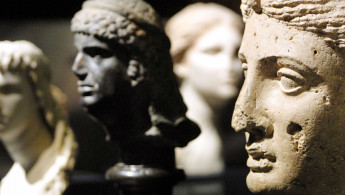Massive volcanic eruption 'triggered collapse of ancient Egypt'
The fall of Cleopatra's Egypt in 30BC to the first Roman emperor Augustus may have been triggered a decade earlier by a giant volcanic eruption, a new study suggests, dispelling widely held notions that infighting and incest caused her empire to collapse.
Historians had previously attributed the downfall of the 300-year Ptolemaic dynasty, of which Cleopatra was to be the final ruler, to decadence and infighting, with siblings marrying each other for political reasons.
Cleopatra then forged what was to be a doomed political alliance with her lover, Mark Anthony, but their forces were defeated at the battle of Actium and the pair killed themselves.
Egypt then became a province of the newly formed Roman Empire.
But a new study based on evidence from ice-core records of volcanic eruptions dates may have an alternative explanation for Cleopatra's downfall.
An analysis of the evidence shows that a giant volcanic eruption in 44BC may have affected rainfall, leading to plagues, famines and social unrest which weakened Cleopatra's hold on power ten years before her defeat.
"We've shown evidence that the failure of these floodwaters are connected to things like revolt and sales of land, and these are triggering social stresses," Francis Ludlow, a climate historian at Trinity College Dublin, and co-author of the study, said, according to The Guardian.
Researchers studied a monument known as al-Miqyas, or the Islamic Nilometer, which is an architectural structure that has preserved a record of the Nile's summer peaks since the early 7th century.
Every summer monsoons from the equator would wash over the Nile's upper areas, providing a water source that would wash silt down the river and provide fertile soil for agriculture.
Historical records indicate that one such period of water shortages occurred during the rule of the Ptolemaic dynasty in roughly 44BC as a volcanic eruption blasted a plume of ash and hot gases into the atmosphere which suppressed the monsoon rains.
Ultimately, the resulting shortage of food paved the way for a plague as rural residents swarmed to cities and the subsequent social unrest made it easier for Rome to defeat Cleopatra.
A growing number of academics are turning to climate records, as well as genetic and disease data, to reinterpret significant historical events, although it is rare to reach a consensus.
"There's a distrust among historians of attributing big historical events to an environmental influence," said Ludlow.
"We're not saying 'throw out the history books' – we're just saying here's a new angle," he added.
The findings are published in the journal Nature Communications.



![sudan women [getty] sudan women [getty]](/sites/default/files/styles/image_330x185/public/media/images/5019D7F4-52AF-4377-8A05-885D27476479.jpg?h=d1cb525d&itok=tKXV7r-W)